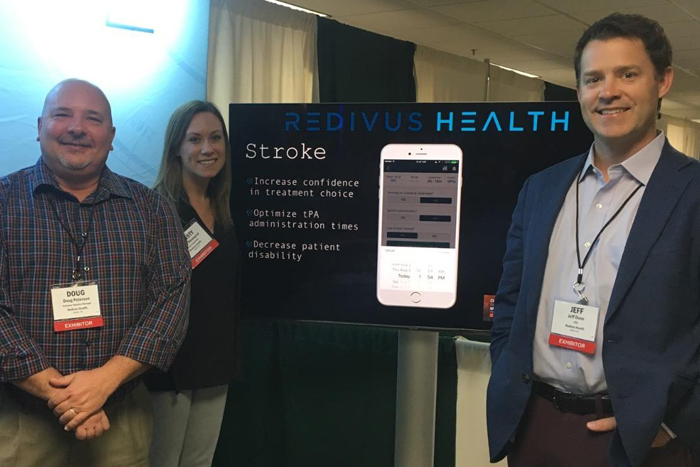The American Heart Association reported 209,000 in-hospital cardiac arrests and more than 350,000 out-of-hospital cardiac arrests in 2016. During high-stress cardiac events like cardiac arrest, timing and precision can be the difference between life and death.
But when every second counts, medical professionals can’t stop the clock to consult on the best treatment practices for the patient. That’s why Olathe, Kansas-based medical software company Redivus has developed a cloud-based platform and app that provides actionable, step-by-step clinical guidance to doctors, nurses and paramedics during an emergent healthcare event.
“Redivivus means to be brought back to life. That’s why we named the company Redivus,” said Jeff Dunn, D.O., Redivus Health founder and CEO. “We’re a healthcare software company that’s augmenting provider decisions in time-critical diagnosis.”
Redivus was founded by five physicians and launched in 2015. They have nurses and technologists on staff to help who are helping to standardize procedures in time-critical events like cardiac arrest, stroke and sepsis.
Dunn said that in 2012, he observed a cardiac arrest event involving a 62-year-old patient and noticed that the doctors attending to the event didn’t seem to know what to do next. They had what he called “adrenaline brain,” caused by a combination of chaos and a lack of practicing for such an event.
“That’s what led to the founding of this company. […] Healthcare providers are humans too. They make mistakes, they make errors,” said Dunn. “The opportunity to help people and support them better in these stressful and anxiety-provoking events is really what we are all about.”
Dunn explained Redivus as being something like a GPS for time-critical events. The app provides turn-by-turn navigation and documentation to guide medical professionals through a high-mortality event.
“It’s a very simple comparison, but the whole idea of going from a paper map to a navigational map is really what we’re trying to do,” said Dunn. “Why not apply the same kind of concept to a cardiac arrest event and give healthcare providers a navigational way to say whether they’re following evidence-based practices or not?”
Launching into the application takes 3-5 seconds and can instantly automate a 35-40 step procedure. Dunn said that cardiac arrest has a wide variability of survival rates and the goal is to standardize the steps taken.
“Some places like Seattle and King County have a 20% survival rate, and then you have other places like Detroit that have had a historically low rate, 3%,” said Dunn. “We know evidence-based steps lead to better outcomes and better care.”
Every screen on the app is a question. It starts with very basic things like, “Is the patient breathing,” or “Does the patient have a pulse,” and moves on to prompt and time CPR, gives medication options and timers, and so on.
“It takes that whole chaotic event and organizes it in a fashion that helps the healthcare provider augment their decisions, and helps them get through the event,” said Dunn.
The other component of the app is documentation accuracy. Dunn said that typically, documentation of procedures from high-stress events isn’t done accurately and can end up written on anything from napkins to someone’s scrubs.
“The real opportunity here is to take a chaotic event and help the provider through it with 100% evidence-based compliance and be able to provide 100% accurate documentation from the event,” said Dunn. “Imagine if you could run 1000 cardiac arrests through this, what you could glean from a clinical perspective about who’s surviving and who’s not surviving.”
A University of Kansas Health System partnership started in April 2017 initially onboarded five partner hospitals to the Redivus platform. Since then, the pilot program has expanded to 14 facilities including hospitals, EMS providers and nursing homes, with around 500 end users. The partnership is leveling the care available to both rural and urban Kansans.
“The goal of the Kansas Heart and Stroke Collaborative is to improve the care and outcomes of rural Kansans with heart attacks and strokes,” said Robert Moser, M.D., executive director, Kansas Heart and Stroke Collaborative. “It is our hope that the Redivus application will become a tool needed for rural health providers to utilize the right care at the right time.”
Of Kansas’s 131 hospitals, 84 are critical access hospitals that serve rural communities.
“By working with our state’s premier academic medical center, we can partner to bring this life-saving mobile technology to all regions of our home state. It’s the right thing to do,” said Dunn.
__
Christine McGuigan is the Managing Editor of Silicon Prairie News.






